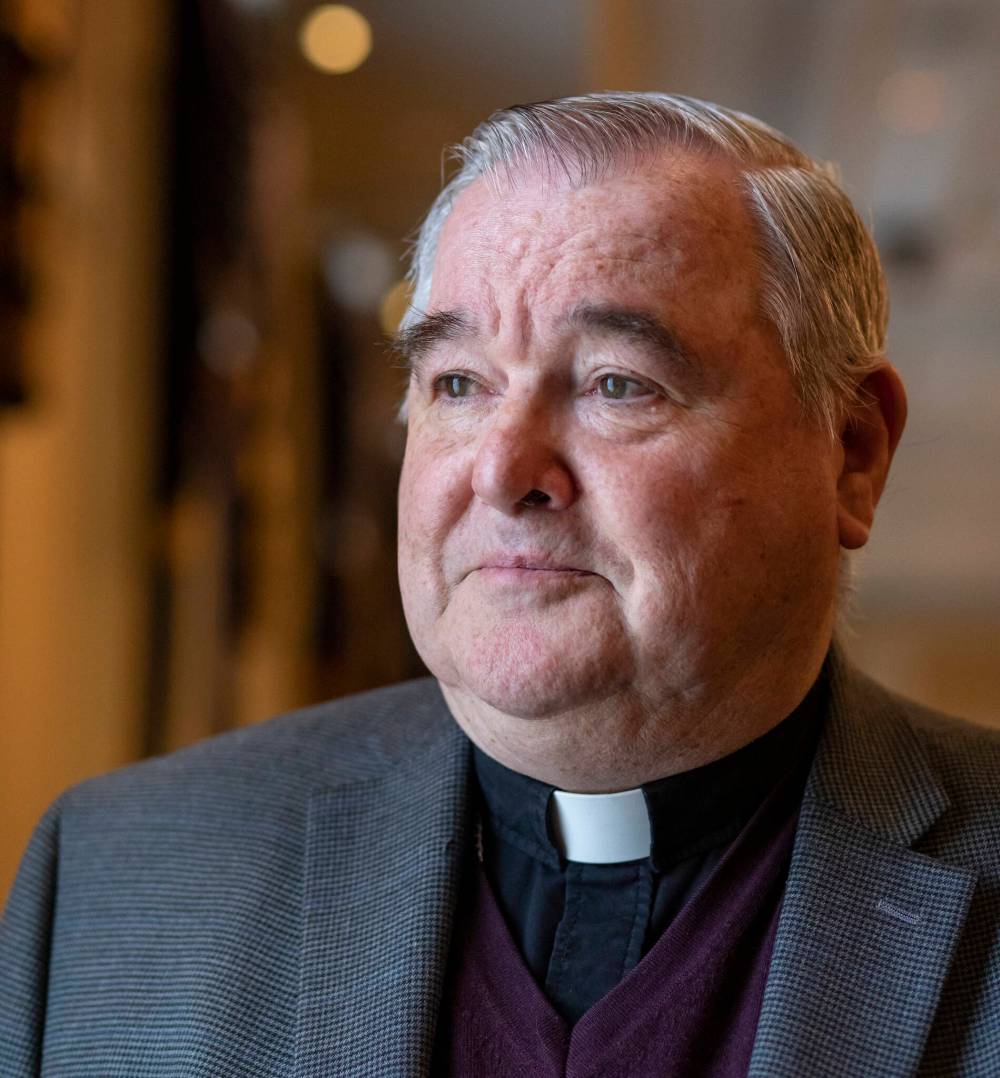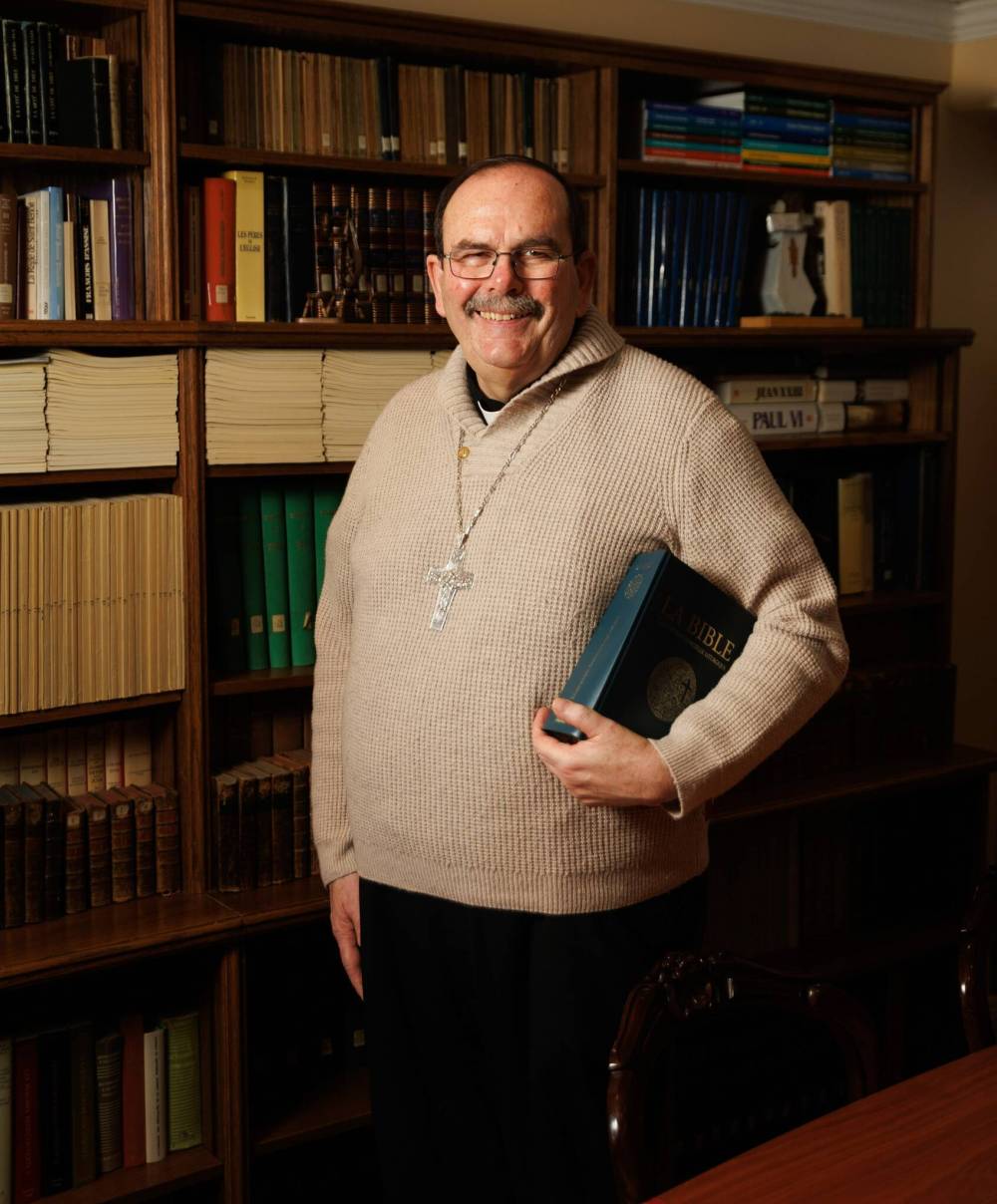‘A positive hopeful step’
Vatican document allowing blessings for same-sex couples welcomed by city man who is a gay Catholic
Advertisement
Read this article for free:
or
Already have an account? Log in here »
To continue reading, please subscribe:
Monthly Digital Subscription
$0 for the first 4 weeks*
- Enjoy unlimited reading on winnipegfreepress.com
- Read the E-Edition, our digital replica newspaper
- Access News Break, our award-winning app
- Play interactive puzzles
*No charge for 4 weeks then price increases to the regular rate of $19.00 plus GST every four weeks. Offer available to new and qualified returning subscribers only. Cancel any time.
Monthly Digital Subscription
$4.75/week*
- Enjoy unlimited reading on winnipegfreepress.com
- Read the E-Edition, our digital replica newspaper
- Access News Break, our award-winning app
- Play interactive puzzles
*Billed as $19 plus GST every four weeks. Cancel any time.
To continue reading, please subscribe:
Add Free Press access to your Brandon Sun subscription for only an additional
$1 for the first 4 weeks*
*Your next subscription payment will increase by $1.00 and you will be charged $16.99 plus GST for four weeks. After four weeks, your payment will increase to $23.99 plus GST every four weeks.
Read unlimited articles for free today:
or
Already have an account? Log in here »
Hey there, time traveller!
This article was published 08/01/2024 (683 days ago), so information in it may no longer be current.
“This a moment to celebrate.”
That’s what Thomas, a gay Roman Catholic in Winnipeg who doesn’t want his last name used, said about a document released by the Vatican last month that allows blessings for same-sex couples.
While the document, titled On the Pastoral Meaning of Blessings, says priests can bless same-sex couples, it also reaffirms marriage as being only between a man and woman in the church.

Thomas knows that. But he still welcomes the change.
Until now, he said, the focus of the church has “been on our sexuality, what we do in bed. This rejects that. We are not to be seen as only sinners.”
At the same time, the Church isn’t going far enough, he said.
“There is still the understanding there is something disordered about being gay,” Thomas said. “We are still seen as people who need help.”
He looks forward to the day when gay Catholics will be seen like “every other human being, as people who are good, enriched, healed and elevated by the Holy Spirit.”
The church is not yet ready to go that far, he said, in part because “it risks schism” with conservative Catholics in the developing world who want it to maintain a traditional stance when it comes to LGBTTQ+ people.
He said he is grateful to Pope Francis, “who really wants to make it clear that everyone is welcome in the Church,” he said.
For now, the announcement is a “positive hopeful step,” said Thomas, a member of Dignity Canada, an organization for Roman Catholic lesbian, gay, bisexual and transgender people. “Even if there is a ways to go… the door is open a crack, the padlock removed.”
While all the attention in the media was on blessings for same-sex couples when the document was announced, Richard Gagnon, Bishop of the Archdiocese of Winnipeg, said it is more about the role of all kinds of blessings in the life of the church — not just that one thing.
“It’s a pastoral letter from the Holy Father to the church, providing advice for bishops and priests about blessings,” he said.
Although it talks about blessings for same-sex couples, Gagnon emphasized it isn’t the same as marriage within the Church. “It’s not the same as the Church legitimizing a same-sex relationship,” he said. “It’s just a blessing done outside the official liturgy of the Church.”
Gagnon said he would bless a same-sex couple “according to the conditions spelled out by the Church.”
“It’s my responsibility to bless everyone,” he said. “It’s part of what I do, it’s a beautiful thing… I want to bless anyone who is seeking God’s will for their lives, not be unwelcoming and turn them away. I want to honour their desire to connect with God.”
Gagnon has not yet been approached by a same-sex couple seeking a blessing.
“But I’m sure it will happen,” he said.
For Albert LeGatt, Bishop of the Archdiocese of St. Boniface, the reporting in the media about the announcement prompted a lot of confusion about what the document meant, with some — especially in African countries — thinking it legitimized same-sex marriage.
In fact, opposition from some African bishops to the document was so fierce the Vatican issued a clarification stating that the blessing of same-sex couples is not the same as marriage in the Church, but that blessing them isn’t “heretical” or “blasphemous,” either.
Despite that clarification, some African bishops said they will not allow their priests to conduct such blessings.
For LeGatt, the document was clear about the Church not approving same-sex marriages. “It almost bends over backwards to say this is not a new teaching on the meaning of marriage,” he said.
At the same time, he sees the “pastoral hand” of Pope Francis behind it. “It’s about his compassion and care for individuals,” he said.
LeGatt would also bless same-sex couples, as long as it didn’t contravene Church guidelines.

“It would not be a blessing on their union, but on them as individuals,” he said, adding he would want to do it in a pastoral way that includes getting to know them.
“It would be a blessing from a God who loves us all unconditionally, who wants the very best in life for us. It would be a way of saying you have a place in God’s heart and in the Church.”
Darrin Gurr is the priest at St. Gianna Beretta Molla Roman Catholic Church in southwest Winnipeg, which describes itself as “a welcoming community to LGBTTQ+ Catholics.”
For him, the document is also about “helping us to see that God’s blessings are for all of creation… this is just the most recent reminder of that.”
When it comes to blessing same-sex couples, the document “widens the scope,” he said, noting that over time the church had become “a bit restrictive” in terms of who it would bless.
The document “opens things up,” he said, adding “of course” he would bless people who are in a same-sex relationship.
“Anyone who wants a blessing, it’s my responsibility to give it to them, anyone who wants God’s grace,” he said, adding there are gay and trans people in his congregation.
“It’s not our job to judge people.”
Norman Prince is president of Dignity Canada. He was excited when he first heard about the blessing of same-sex couples.
“I thought, ‘Finally, they are recognizing us!’” he said.
But that excitement turned to disappointment when he read the document and saw it didn’t affirm same-sex marriage. Reading it “felt like another slap on the face,” said Prince, who lives in Montreal. “Nothing in church doctrine has changed.”
At the same time, he saw parallels between the way LGBTTQ+ people are viewed by the Roman Catholic Church today and the way it viewed Indigenous people in the past.
“For a long time, Indigenous people were seen as lesser, as not fully human,” he said. “That’s the way LGBTTQ+ people feel today, because of their sexuality, not able to be fully Christian.”
Fortunately, that view of Indigenous people has been renounced — something he hopes can happen for LGBTTQ+ people who want to marry in the Church.
Until then, Prince gives Pope Francis a lot of credit for addressing the topic and for his pastoral response to people on the margins, such as LGBTTQ+ Christians.
“He can’t change things overnight,” Prince said. “I have great respect for the Pope. He’s doing the best he can.”
faith@freepress.mb.ca
The Free Press is committed to covering faith in Manitoba. If you appreciate that coverage, help us do more! Your contribution of $10, $25 or more will allow us to deepen our reporting about faith in the province. Thanks! BECOME A FAITH JOURNALISM SUPPORTER

John Longhurst has been writing for Winnipeg's faith pages since 2003. He also writes for Religion News Service in the U.S., and blogs about the media, marketing and communications at Making the News.
Our newsroom depends on a growing audience of readers to power our journalism. If you are not a paid reader, please consider becoming a subscriber.
Our newsroom depends on its audience of readers to power our journalism. Thank you for your support.
The Free Press acknowledges the financial support it receives from members of the city’s faith community, which makes our coverage of religion possible.










